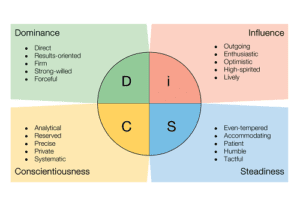The CEO of a relatively small but very successful economic development and investment firm includes an uncommon step in her on-boarding process for new employees: everyone takes a DiSC assessment.
DiSC is a proven tool designed to better understand yourself and your employees — and how everyone interacts and works together. A DiSC assessment provides a 2×2 matrix that identifies the degree to which a person possesses four different thinking and behavioral styles. DiSC identifies the way that someone approaches the world, how they process information and make decisions, and how they prefer to relate to each other.
The CEO has found that knowing her own DiSC and the DiSC assessments of her staff, she is better able to lead, create effective teams, and build a strong, stable organizational culture. According to the CEO, “DiSC makes everyone more aware of both our similarities and our differences — and that these similarities and differences are normal. I think DiSC helps people work with those differences and respect each other more. People realize that we’re striving toward the same strategic goals and vision, but we all work differently, and that’s OK.”
Research shows that the general population is consistently divided proportionately among the four quadrants, and a person’s DiSC assessment tends to remain unchanged over time. Most find DiSC easier to apply in real-world work and team situations than the 16 Myers-Briggs types. When people participate in DiSC, it significantly helps:
- Improve your awareness about how your colleagues express themselves, make decisions, get motivated, and how they go about solving problems.
- Strengthen your own understanding about how you express yourself, make decisions, get motivated, and how you go about solving problems.
- Increase the effectiveness of working relationships. Knowing everyone’s DiSC allows you to understand and act on differences in expression and information processing styles, and the different communication needs of others. It helps you recognize how different people view and accomplish their work, what motivates and drives their behaviors, and how they interact with others.
And, it can be used right away. For example, to get a quick sense of someone’s DiSC profile, ask these simple questions:
 Does this person appear to prefer living and working at a fast pace? Or, does this person seem to prefer a methodical, thoughtful approach?
Does this person appear to prefer living and working at a fast pace? Or, does this person seem to prefer a methodical, thoughtful approach?- Does this person tend to be quickly accepting of people and information? Or does this person tend to be more questioning and challenging?
-
-
- Fast Pace/Questioning — Typically a “D” (Green) style prevails
- Fast Pace/Accepting — Typically an “i” (Red) style prevails
- Thoughtful/Accepting — Typically an “S” (Blue) style prevails
- Thoughtful/Questioning — Typically a “C” (Yellow) style prevails
-
For more, read Arden Coaching’s blog, “DiSC Assessments: Understanding Your Team — and Yourself.”
There are many versions of DiSC available, including free online variants. While those may be fun, they are not worth much. At Arden Coaching, we recommend and use Wiley’s DiSC® assessment tool. Wiley has conducted extensive research over the years. Their DiSC assessments are verifiable, highly reliable, and very dependable, generating consistent results over time. To be most effective, an expert is needed to accurately translate the results. For more, read Arden Coaching’s “4 Tips for Getting the Most From a DiSC Assessment.”
To learn more about DiSC assessments, executive coaching, and team performance, contact the executive coaches at Arden Coaching at info@ardencoaching.com or 646.684.3777.

